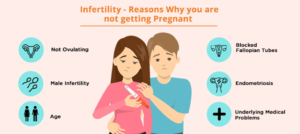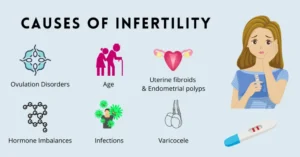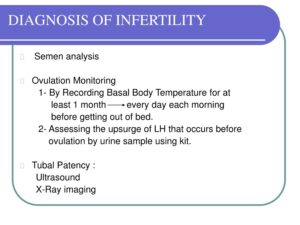Common Signs of Infertility: Causes, Treatments & Doctor Advice
18 September, 2024

Infertility is a common issue faced by many couples worldwide, affecting the ability to conceive after one year of unprotected sex. In some cases, infertility can be due to underlying health conditions in either partner. Understanding the signs, causes, and treatment options for infertility is crucial in seeking timely medical advice and finding solutions. At Signora Maternity Clinic in Bangalore, under the expert care of Dr. Sushma Harish, patients receive comprehensive infertility care and support.
Definition of Infertility
Infertility is defined as the inability to conceive after 12 months of regular, unprotected intercourse for women under 35, and after 6 months for women over 35. It can affect both men and women and may be caused by various factors.

Common Signs and Symptoms of Infertility
For Women:
- Irregular periods: Unpredictable menstrual cycles can indicate ovulation issues.
- Painful periods: Severe cramps or pelvic pain during menstruation may be linked to conditions like endometriosis.
- Absence of periods: No periods for months or very light flow could signal hormonal imbalances.
- Pain during intercourse: Painful sex can be a symptom of underlying reproductive issues.
Read about: Best PCOD treatment in Bangalore
For Men:
- Changes in sexual function: Problems with ejaculation, reduced libido, or difficulty maintaining an erection.
- Testicular pain or swelling: Issues with the testicles may affect sperm production.
- Abnormal semen: A low sperm count or poor sperm motility.
- Difficulty with ejaculation: Inability to ejaculate or ejaculation of a low volume of semen.
Click Here to know about: Infertility/ IUI/IVF programming in Bangalore
Causes of Infertility
For Women:

- Ovulation disorders: Conditions like Polycystic Ovary Syndrome (PCOS) can interfere with regular ovulation.
- Blocked fallopian tubes: Caused by infections, previous surgeries, or conditions like endometriosis.
- Uterine issues: Fibroids, polyps, or other abnormalities affecting implantation.
- Age: Female fertility declines with age, especially after 35.
Read About: Best Female infertility treatment in Bangalore
For Men:
- Low sperm count: Insufficient sperm production can prevent successful fertilization.
- Sperm motility issues: Poor sperm movement can make it difficult for sperm to reach the egg.
- Hormonal imbalances: Low testosterone or other hormonal issues affecting sperm production.
- Testicular problems: Injury or infections affecting sperm-producing organs.
Diagnosis Steps for infertility

Diagnosing infertility involves various tests for both men and women to identify the root cause. At Signora Maternity Clinic, Dr. Sushma Harish offers personalized diagnosis through:
- Medical history review: Gathering details of menstrual cycles, sexual history, and medical conditions.
- Ovulation testing: Checking for ovulation through blood tests or ovulation kits.
- Ultrasound: Imaging the uterus and ovaries to detect abnormalities.
- Semen analysis: Examining the sperm count, motility, and overall health.
- Hysterosalpingography (HSG): Checking for blockages in the fallopian tubes.

Medical Conditions Linked to Infertility
Certain medical conditions may increase the likelihood of infertility:
- Endometriosis: Growth of endometrial tissue outside the uterus causing scarring and blockages.
- PCOS: Hormonal imbalance affecting ovulation and egg quality.
- Thyroid disorders: Both hyperthyroidism and hypothyroidism can impact fertility.
- Varicocele in men: Enlarged veins in the scrotum that affect sperm production.
Treatment Methods
Treatments for infertility vary depending on the cause and may include:
- Medications: Hormonal treatments to stimulate ovulation or improve sperm production.
- Intrauterine insemination (IUI): Inserting sperm directly into the uterus during ovulation.
- In vitro fertilization (IVF): Fertilizing eggs outside the body and implanting the embryo in the uterus.
- Surgery: Correcting issues like blocked fallopian tubes, fibroids, or varicoceles.
- Lifestyle changes: Weight management, quitting smoking, and reducing stress can improve fertility.
Testing for Infertility in Men and Women
- For women: Blood tests to check hormone levels, ultrasound for reproductive health, and HSG to assess fallopian tubes.
- For men: Semen analysis for sperm count and motility, hormone testing, and testicular examination.
Risk Factors of Infertility
Several risk factors can increase the chances of infertility:
- Age: Female fertility declines significantly after age 35.
- Lifestyle habits: Smoking, excessive alcohol consumption, and drug use can impair fertility.
- Obesity: Being overweight or underweight can impact hormone balance and ovulation.
- Chronic illnesses: Conditions like diabetes or autoimmune diseases can affect fertility.
When to See a Doctor
It is important to consult a doctor if:
- You are under 35 and haven’t conceived after 12 months of trying.
- You are over 35 and haven’t conceived after 6 months.
- You have irregular, absent, or painful periods.
- You experience sexual dysfunction or abnormalities in sperm function.
At Signora Maternity Clinic, Dr. Sushma Harish and her team are dedicated to diagnosing and treating infertility in both men and women. If you are concerned about your fertility, early intervention can significantly increase your chances of conception.
Prevention Methods
While not all causes of infertility can be prevented, there are steps you can take to improve reproductive health:
- Maintain a healthy weight: Balanced nutrition and exercise are essential for hormonal balance.
- Avoid smoking and limit alcohol: These habits can negatively impact both sperm and egg health.
- Manage stress: Stress can affect ovulation and sperm production.
- Get regular check-ups: Early detection of reproductive issues can help in addressing problems before they worsen.
Medication and Drug Treatments
Infertility treatments may involve medications like:
- Clomiphene citrate (Clomid): Stimulates ovulation in women with ovulation disorders.
- Letrozole: Another ovulation-stimulating drug for women with PCOS.
- Gonadotropins: Hormones that stimulate the ovaries to produce multiple eggs for IVF.
- Medications for men: Hormonal treatments to improve sperm count and quality.
If you’re struggling with infertility, don’t hesitate to seek professional help. At Signora Maternity Clinic, Dr. Sushma Harish and her expert team are here to provide you with personalized care and effective treatment options. Schedule your consultation today to take the first step toward your parenthood journey. Contact us at [Signora Maternity Clinic] for more information or to book an appointment.
Discover comprehensive women’s healthcare services at Signora Maternity, our premier fertility Clinic in Bangalore. From Pap smear and dilation and curettage treatments to high-risk pregnancy care and postnatal support, Signora Maternity offers a range of specialized services. Our expert team provides personalized care for menstrual disorders, fertility issues, repeated abortions, antenatal care and post-menopause concerns. Additionally, we offer HPV vaccination, Mirena intrauterine IUD insertion, and menstrual cup consultations. Trust Signora Maternity for top-notch preconception counseling and female infertility treatments. Experience excellence in maternity care at Signora Maternity, known as the best maternity hospital in Bangalore. Visit us for UTI and PCOD treatments tailored to your needs. Your health and well-being are our priority. Schedule an appointment today.
Visit Our Maternity clinic Today
Name: Signora Maternity and Gynecology Clinic
Address: 396, 1st floor , 8th main, 7th Cross Rd, BTM 2nd Stage, Bengaluru, Karnataka 560079
Contact number: 6362141790








